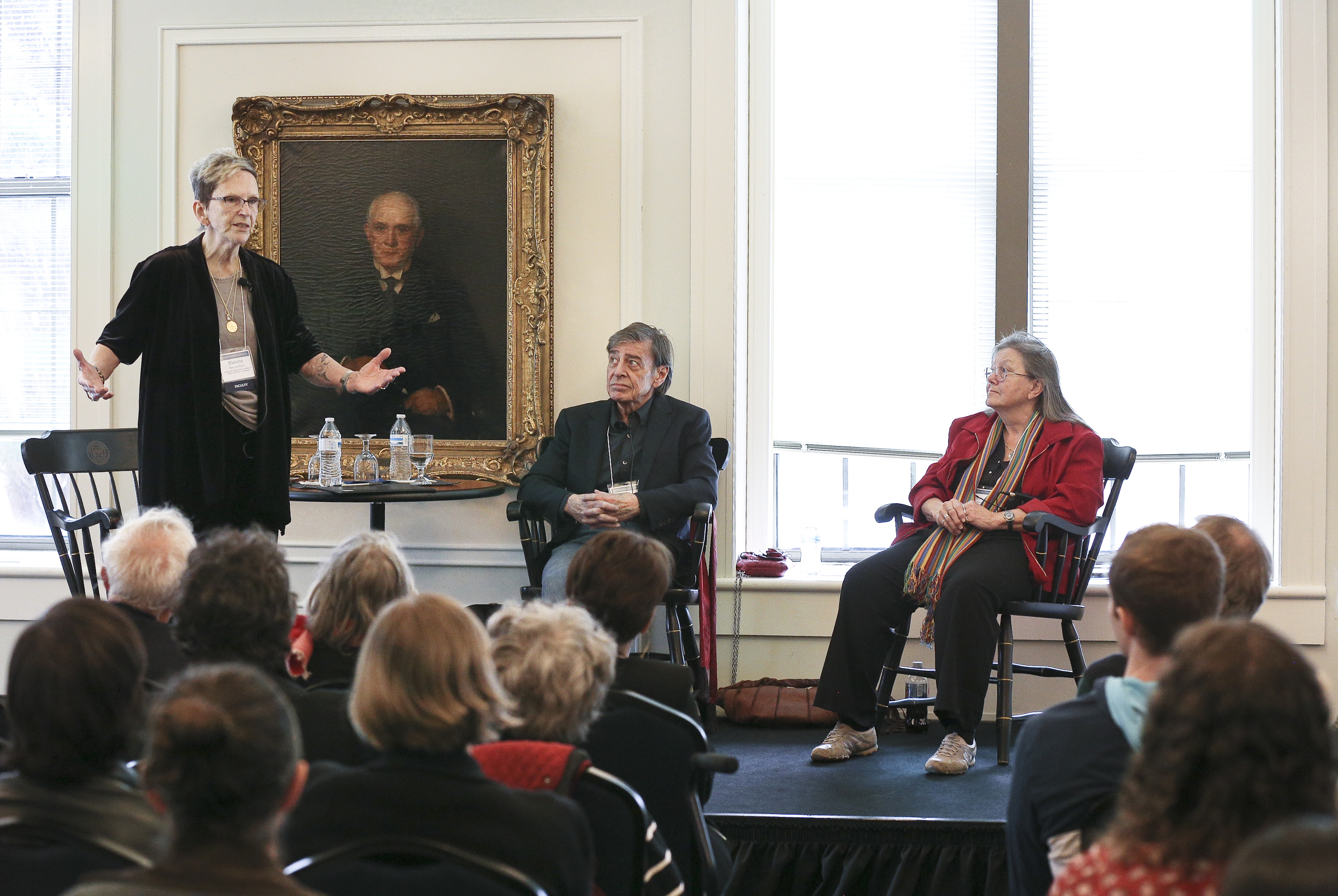In 1989 Emilie and Herbert Klagsbrun established The Daniel Klagsbrun Symposium on Creative Arts and Moral Vision as a living memorial to their son, Daniel Klagsbrun, a 1986 graduate of Connecticut College. This year the symposium was held on April 11 with a focus on “Gay Culture and Courage after the Stonewall Rebellion.” Blanche Boyd, the Roman and Tatiana Weller Professor of English and Writer-in-Residence, hosted the symposium, which occurs every two years. The guest speakers were Dorothy Allison, author of Bastard Out of Carolina and recipient of several Lambda Literary Awards, and Michael Denneny, editor of Christopher Street, a gay-orientated magazine based in New York City.
Boyd introduced the event, stating that the Symposium’s theme “Creative Arts and Moral Vision” has become increasingly relevant since the Klagsbrun Symposium began. “The notion of a moral center in literature is crucial,” Boyd stated. “We don’t write literature simply to entertain people.”
Boyd has arranged The Daniel Klagsbrun Symposium every time since the first year. In her introduction, she explained why she has found it so important to bring authors onto campus to speak to students: “I want people to understand not all good writers are dead. I want to show students that books aren’t born in the library, books are born in the minds of writers.” Boyd also believes that writers benefit from being around each other and discussing writing. “Good writing is catching,” Boyd told the audience. “You have to work hard to catch it, but you can catch it.”
The theme of the event was queer culture after Stonewall. The Stonewall Riots were a series of protests in 1969 by queer people against police brutality and discrimination. Boyd stated, “Stonewall was the beginning of people saying, ‘We had had enough, you are not going to treat us like this for being gay, we haven’t done anything wrong.’ After Stonewall, gay culture blossomed. Michael and Dorothy are two of the real shakers and movers in that happening.”
“Dorothy Allison was probably the breakout star of gay writing,” Boyd continued. Allison worked as an editor for several feminist magazines, wrote short stories, published novels, and was very involved in activist culture throughout the era. At the beginning of the ‘70s, Denney was an editor for the Macmillan Company and St. Martin’s Press.
“He was the first editor to bring gay writers into the mainstream in a big way,” Boyd told the audience. Boyd was one of the gay writers Denney supported. He encouraged her to write and told her he would publish a novel by her if she wrote one. After working as an editor at Macmillan, Denneny co-founded Christopher Street. The magazine was deliberately modeled after The New Yorker. According to Boyd, the magazine was a way of saying, “We are here, and we are smart.” After Stonewall, because of people like Denney and Allison, “The support for gay writing was suddenly there,” Boyd said.
After the introduction, the interview portion of the symposium began with a simple question from Boyd to Allison: “What the hell happened?”
Allison laughed and replied, “I wanted to be a progressive troublemaker.” She continued, “I wanted justice for my people. But, the thing is, I had a range of people. I was raised poor, poor people were my people. Working class people were my people. Lesbians were my people. Outrageous southerners were my people.”
Denney, Allison, and Boyd felt that shame had been indoctrinated in them as young queer people because of their queerness. “I grew up believing these primary things about me were unspeakable,” Allison stated. Denney described attending a support group for questioning students at his college. “We all told our stories, and every single person had tried to commit suicide,” Denney said.
“Up until that night [Stonewall] queer people panicked in shame,” Denney told the audience. After the Stonewall Riots, the gay community “immediately began organizing,” Denney said.
Movements inspired each other in this time period. “Before Stonewall, you had the feminist movement, which made people realize the personal was political,” Denney explained.
“We were busy. We were busy. You didn’t do one meeting a night, you did two or three meetings a night. We were very, very clearly self-defined revolutionaries,” Allison stated. “We were trying to live the revolution in our everyday lives.”
Roughly a decade after Stonewall, the AIDS epidemic began. It was a return to the terror of pre-Stonewall America. Denney told the audience that 70% of his friends died. This time period was “almost a comedy but you were sobbing half the time,” Allison stated.
Denney and Allison felt that a large part of “the revolution” was the writing. “You had an entire generation of writers working for the benefit of their community,” Allison said.
However, much of this writing is overlooked today. “In the midst of the horror of the AIDs epidemic, there was this enormous bubbling of culture, and it’s been forgotten,” Allison said.
Allison does not discredit the effect of activism and queer activists specifically, however. “One of the things we gave to this culture, we gave the concept of a range of diversity that this country had never actually honored, but we honored it, we celebrated it,” Allison stated.
“And truly, we gonna make you all jealous ’cause we have a good time. If you have never been to a tea dance [a Sunday evening queer party tradition], well honey I’m sorry. You don’t have to be gay to be drunk on the glory of your own body… That culture, that acceptance of self-love, to have self-love as a queer person, that was an enormous creation that we gave, that we shared,” Allison continued. Addressing the audience, she added, “And I want to share it with all you queer little babies.”
This 19th Daniel Klagsbrun Symposium served as a reminder to not overlook the powerful writing that came out of the 70s and 80s, and to not forget the hard-working activists that fought for justice tirelessly. •










